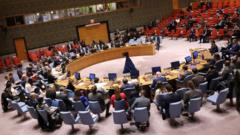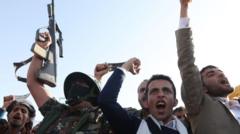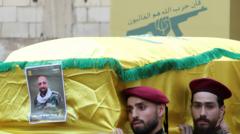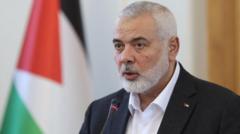The United States has exercised its veto power at the United Nations Security Council (UNSC) to block a resolution aimed at instituting a ceasefire in the ongoing Gaza conflict. This decision, which marks the fourth veto by the US to support its ally Israel during this prolonged war, has drawn widespread criticism from other member states and human rights organizations. In a vote that saw 14 of the 15 council members in favor of the resolution, the document called for an immediate, unconditional, and permanent end to hostilities, and the release of all remaining hostages held by Hamas.
US Vetoes UN Security Council Ceasefire Resolution on Gaza Conflict

US Vetoes UN Security Council Ceasefire Resolution on Gaza Conflict
US blocks fourth attempt to establish a ceasefire in Gaza, igniting international concern over humanitarian crisis and diplomatic implications.
Robert Wood, the Deputy US Ambassador to the UN, stated that the resolution undermined the critical connection between achieving a ceasefire and the necessity of releasing hostages. He characterized the resolution as one that could potentially send a harmful message to Hamas by allowing them to perceive an absence of accountability for their actions. The proposed draft also rejected the assertion that Palestinians were being starved of essential resources, an issue that has become increasingly pressing as the UN reports worsening living conditions for many in the besieged regions of northern Gaza.
In the wake of the veto, criticism from around the globe intensified. Chinese representatives in the UNSC expressed deep concern, asking whether the international community was implying that Palestinian lives did not hold value. French officials echoed this sentiment, asserting that international humanitarian law was being disregarded and emphasizing the urgent need for a ceasefire. The UK expressed a desire to alleviate suffering in Gaza and facilitate the release of all hostages amid the ongoing conflict.
Human Rights Watch also weighed in, with its UN director condemning the US for ensuring Israel's impunity while alleging ongoing human rights violations in Gaza. Israel, on the other hand, vehemently disputes these claims, maintaining that its military actions are targeted at Hamas fighters and that provisions for civilian evacuations and medical aid are being implemented.
The conflict’s escalatory trajectory began after Hamas militants launched a surprise attack on Israeli communities, claiming the lives of approximately 1,200 individuals and taking over 250 as hostages. In response, Israel's military campaign has led to staggering casualties, with upwards of 43,920 reported deaths in Gaza since the offensive began.
The UNSC's lack of consensus and ongoing tensions highlight the complexities of international diplomacy in conflict situations, where varying humanitarian priorities clash with geopolitical alliances and interests.
In the wake of the veto, criticism from around the globe intensified. Chinese representatives in the UNSC expressed deep concern, asking whether the international community was implying that Palestinian lives did not hold value. French officials echoed this sentiment, asserting that international humanitarian law was being disregarded and emphasizing the urgent need for a ceasefire. The UK expressed a desire to alleviate suffering in Gaza and facilitate the release of all hostages amid the ongoing conflict.
Human Rights Watch also weighed in, with its UN director condemning the US for ensuring Israel's impunity while alleging ongoing human rights violations in Gaza. Israel, on the other hand, vehemently disputes these claims, maintaining that its military actions are targeted at Hamas fighters and that provisions for civilian evacuations and medical aid are being implemented.
The conflict’s escalatory trajectory began after Hamas militants launched a surprise attack on Israeli communities, claiming the lives of approximately 1,200 individuals and taking over 250 as hostages. In response, Israel's military campaign has led to staggering casualties, with upwards of 43,920 reported deaths in Gaza since the offensive began.
The UNSC's lack of consensus and ongoing tensions highlight the complexities of international diplomacy in conflict situations, where varying humanitarian priorities clash with geopolitical alliances and interests.




















